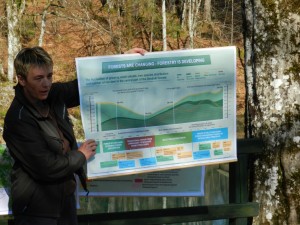More than 40 people, representing all ARANGE consortium partners, met for the first Annual Meeting of the ARANGE project and responded to the call of the Slovenian colleagues who organized an extraordinary meeting and set the frame for three productive days at the venue of the Biotechnical Faculty in Ljubljana.
The main focus of the meeting was to highlight the results of the last 14 months since the project kicked-off and to provide the floor for physical exchange in specified working groups to further elaborate on the content of the work packages and to refurbish and finalize the last activities for the first major tasks to be accomplished. While Days 1 + 3 were assigned to in-house work, Day 2 was organized as a field trip to the Slovenian Case Study Area in the north-western parts of the Dinaric Alps (Snežnik Mt.). Representatives of the Slovenian Forest Service, Regional Unit Postojna, provided the excursion group members with a glimpse on forest management planning approaches from the past to the present (see picture).
Figure 1: Representative of the Slovenian Forest Service presents the historical development of forest management approaches in the region (picture by P. Huber/EFICEEC)
After a first introductory lesson into the Snežnik forests the field trip continued with a walk through several forest stands, highlighting the great diversity within a Forest Management Unit in the Dinaric silver fir-European beech forests and providing insights into some of the challenges forest management planning authorities need to take into account. At carefully selected sites the hike stopped for flash presentations, e.g. on timber production, game management and nature conservation. Packed with new knowledge the excursion continued with a group exercise focusing on potential forest management alternatives for four specific forest stands selected by the hosts, each of them presented and discussed as plenary session in the field.
ARANGE (Advanced multifunctional management of European mountain ranges) is a Collaborative Project within 7th Framework Programme and receives funding of the European Commission.




